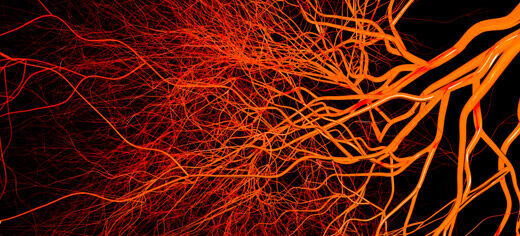
Scientists have shown how a promising viral therapy that delivers a double blow to cancer can sneak up on tumours undetected by hitching a ride on blood cells.
The work, led by researchers from the University of Leeds and The Institute of Cancer Research (ICR), reveals how the ‘hitch-hiking’ virus is shielded from antibodies in the blood stream that might otherwise neutralise its anti-cancer properties.
The findings, from a study in patients, suggest that viral therapies like this can be effectively injected into the bloodstream during routine outpatient appointments - just like standard chemotherapy agents – making them potentially suitable for use against a wide range of cancers.
Reovirus is a promising new way of treating cancer that attacks the disease on two fronts. Not only does the virus kill cancer cells directly, but it also triggers an immune response - like a vaccine – that helps eliminate residual cancer cells.
Many patient trials of reovirus are currently underway, including several in the UK led by the same University of Leeds and ICR scientists. Up until now, however, doctors have not been sure about the best way to deliver the experimental treatment. Although the virus can be injected directly into tumours, this is a relatively complicated procedure requiring considerable technical expertise. This delivery method also makes it difficult to treat tumours deep within the body, such as the liver, lungs, pancreas, and stomach.
Researchers had been concerned that reovirus might not reach the tumours it was supposed to treat if it was delivered intravenously, like standard chemotherapy agents are. They had expected that antibodies in the blood would mop up and neutralise the virus before it arrived at its intended target.
But now tests on a small group of patients have shown that this is not the case. In fact, not only did the virus stay active during its journey through the bloodstream but it also homed in on cancer cells, ignoring nearby healthy tissue.
University of Leeds’ researcher Professor Alan Melcher, who receives funding from Cancer Research UK, jointly led the study. He said: “It seems that reovirus is even cleverer than we had thought. By piggybacking on blood cells, the virus is managing to hide from the body’s natural immune response and reach its target intact. This could be hugely significant for the uptake of viral therapies like this in clinical practice.”
Dr Kevin Harrington from The Institute of Cancer Research and The Royal Marsden NHS Foundation Trust, who jointly led the study, said: “Viral treatments like reovirus are showing real promise in patient trials. This study gives us the very good news that it should be possible to deliver these treatments with a simple injection into the bloodstream. It would have been a significant barrier to their widespread use if they could only have been injected into the tumour, but the finding that they can hitch a ride on blood cells will potentially make them relevant to a broad range of cancers. We also confirmed that reovirus was specifically targeting cancer cells and leaving normal cells alone, which we hope should mean fewer side-effects for patients.”
The study involved 10 patients with advanced bowel cancer who were due to have surgery on tumours that had spread to the liver. All patients were given up to five doses of the reovirus in the weeks before surgery as outpatients.
Blood tests carried out shortly after treatment found the active virus associated with blood cells. Samples taken later showed that the hitch-hiking virus did not overstay its welcome with the cells and was cleared quickly from the system.
When researchers looked at pieces of tissue removed during surgery up to four weeks later, they found ‘viral factories’ and active virus in the tumour, but not normal liver. This confirmed that the reovirus had been delivered specifically to the cancer after being injected into the bloodstream.
Dr Julie Sharp, senior science information manager at Cancer Research UK, which part-funded the research, said: “This promising study shows that reovirus can trick the body’s defences to reach and kill cancer cells and suggests that it could be given to patients using a simple injection. We look forward to seeing how this research develops and if this could one day become part of standard cancer treatment.”
Full details of the work are published today in the journal Science Translational Medicine.
The work was funded by Cancer Research UK, Leeds Experimental Cancer Medicine Centre, University of Leeds, The Institute of Cancer Research, Leeds Cancer Vaccine Appeal, and the Rays of Hope Appeal.
Further information:
Contact: University of Leeds Communications & Press Office: Tel +44 (0)113 343 4031, email pressoffice@leeds.ac.uk
The paper: Adair, RA, "Cell Carriage, Delivery, and Selective Replication of an Onocolytic Virus in Tumor in Patients," is available to journalists at http://www.eurekalert.org/jrnls/scitransmed/. Alternatively, please contact the Science press office on +1 202-326-6440 or scipak@aaas.org.